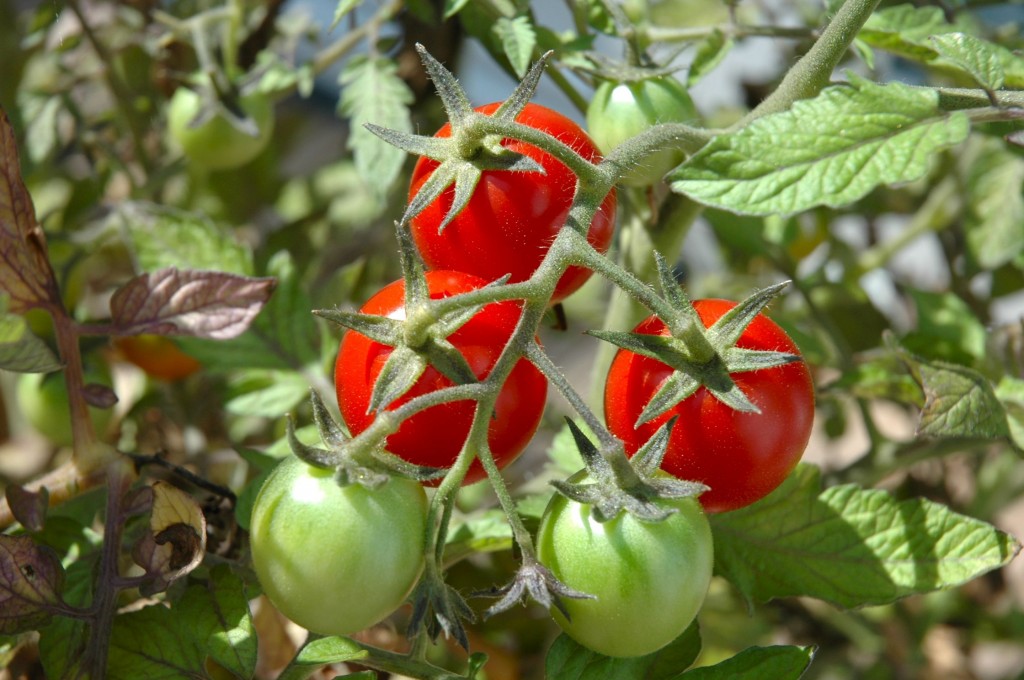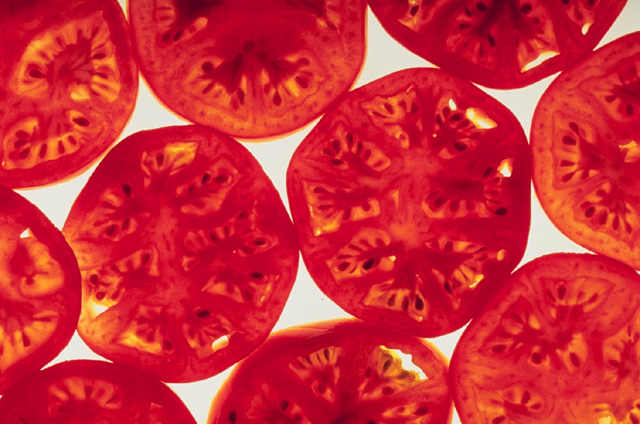by Lisa Servon
Growing up in New Jersey, tomatoes were a major food group during the summers we spent at Midway Beach. We always grew a few plants on the tiny back deck of our bungalow; they loved the hot sun and sandy soil. My father would hoist his long, athletic frame from the faded orange chaise lounge where he lay baking in the sun, smoking and reading the sports pages, to water the plants and pick off the spent marigold buds from the kitchen window box. Practically everyone else we knew grew vegetables, too, and when they came to visit us, our friends would arrive bearing paper grocery bags full of tomatoes, zucchini, and eggplants. Summer squash seemed to supplant that mythical holiday fruitcake that got passed from house to house.
My father, whose Polish parents kept a kitchen garden and weaned him on local produce, taught us to eat tomato sandwiches all summer long. My parents were both teachers, so the money had to stretch farther than usual in the summer. Home grown tomatoes, and clams and crabs harvested from the bay side of our barrier island helped. My father brought home hearty loves of Polish seeded rye bread. We slathered one slice with mayonnaise and layered on thick slices of ripe, red tomatoes, warm from the vine. A liberal shake of salt and pepper brought out their flavor. No lettuce, no meat, no cheese. I trekked home through the hot sand from the beach at midday, my skin taut with salt, my nose peeling and my hair bleached white from the sun. I stood there in the quiet kitchen barefoot in my bathing suit, eating my tomato sandwich over the white enameled sink to catch the drips. Sometimes I ate the tomatoes like apples. Tomato in one hand, salt shaker in the other, I bit into the juicy flesh, sprinkled it with salt, took another bite, sprinkled again, until only the core remained.
Anyone who ridicules New Jersey for its “garden state” moniker has never eaten a Jersey tomato in August.
Two years ago I spent a year in Barcelona. I learned that the Catalans have their own version of the tomato sandwich, and it is ubiquitous. In Catalonia it is practically unthinkable to begin a meal without pan amb tomaquet, or bread with tomato. Even Ferran Adria, famous chef of the Catalan molecular gastronomy restaurant Il Bulli, has devised his own version of deconstructed pan amb tomaquet—a delicate pastry crisp served with tomato ice cream.
Like the Jersey tomato sandwich, Catalan tomato bread is the simplest of food pleasures. They capitalize on what the Catalans call materia prima—best quality ingredients. My favorite way to make pan amb tomaquet is to split and then lightly toast a baguette. Cut a garlic clove in two and rub it on the cut side of the bread; cut a ripe plum tomato in half and do the same. Drizzle with strong, fruity olive oil, sprinkle with flaky sea salt, and eat. It doesn’t get much easier, or more delicious, than that.
* * *
The first Sunday after we had moved to Barcelona, Borg, my husband’s stepmother’s cousin’s husband, which counts for close family in Spain, arrived on our doorstep with a bag full of his home-grown tomatoes, and I was instantly transported back to Midway Beach. Borg is an inscrutable but friendly Dane who knows his plants. He and his wife Olga own a flower shop in Mataro, about an hour’s drive up the coast.
In the days following Borg’s visit, I made tomato sandwiches, ratatouille, and fresh tomato sauce, rising to the challenge of consuming the beauties before a single one spoiled. Somehow, more than with grocery store produce, I felt the need to honor the effort and care that had gone into producing these tomatoes.
A few weeks later we returned from a vacation in the Pyrenees, our trunk half-filled with bottles and cans of a spectrum of olive oil varietals we had gathered in our travels. I developed a strong hankering for bruschetta, Italy’s take on tomatoes and bread, and sent Alec out for tomatoes. He returned with the reddest, ripest ones he could find from the several bins at the produce market. “Hombre,” the grocer said as he began to pay, “these are only good for pan amb tomaquet—nothing else.” His words were issued as a friendly warning, should Alec be thinking to use them in a salad or some other dish. We did not make pan amb tomaquet, but bruschetta is not so far off. It seems that every country that produces good tomatoes has come up with its version of a tomato sandwich. To me, it tastes like home.
Lisa Servon is Professor and former dean of the Milano Graduate School of International Affairs, Management and Policy at the New School. When she’s not teaching or writing, she’s hot on the trail of the perfect tomato.


